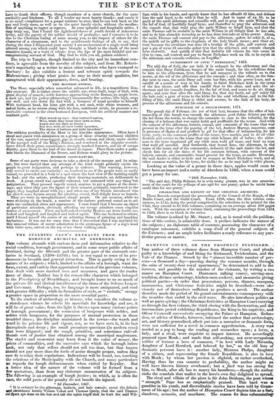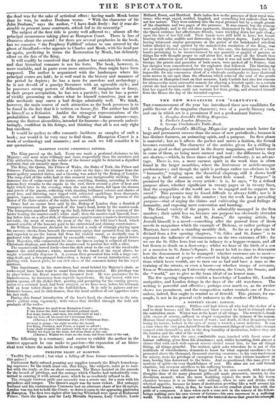HAMPTON COURT, OR THE PROPHECY FULFILLED. , TIES author of
these volumes dates from Hampton Court, and pleads guilty to a knowledge of and liking for Richmond, Twickenham, and thd Vale of the Thames. Struck by the "almost incredible number of persons—a thousand a day—passing, during the summer months, thrones the suite of twenty-four royal apartments," he determined to add to the interest, and possibly to the number of the visitants, by writing a ray mance on Hampton Court. Huntsmen talking venery, serving-men tradition, divines archanlogy, kitchen-men cookery, and monarchs giving political parties—in order that processions, persons, dinners, masques" mummeries, and Christmas festivities might be described—were obviously not of themselves sufficient to produce a novel. The author therefore made the period of his grand entertainments contemporary with the troubles that ended in the civil wars. He also introduces polities as well as party-giving; the Christmas festivities at Hampton Court carrying us through the first volume, the third closing with the Restoration, and the intermediate period exhibiting Republicans, the King ia his captivity, and Oliver Cromwell successively occupying the Palace at Hampton. Reflec-i tion, or advice of friends, however, informed the author that archaeology; art, and history generalized, albeit put into a narrative or dramatic form.,. were not sufficient for a novel in common apprehension. A story wail needed as a peg to hang the reading and researches upon ; a lover, a. lady, and a rival, were requisite to impart interest He accordingly, pounced upon Monk; and made that self-seeking, not over-scrupulous soldier of fortune a hero of romance, "in love with Lady Miranda,daughter of Lord Hertford, and beloved by her," as the old lists of dramatis persona have it : another lady, Mistress Phelps, daughter' of a citizen, and representing the female Republican, is also in love with Monk ; by whom her passion is slighted, or rather overlooked, Having thus far run counter to probability, the author might ws well have thrown history overboard; but a fact was too strong for him, so Monk, after all, has to marry his laundress,—though the author sinks the scandals that malice in the hero's own day delighted to spread:. The rival and villain of the piece is Sir John Denham, the poet whose " strength " Pope has so emphatically praised. This bard was a gambler in his youth, and discreditable stories have been told by Grammont of his age ; but the author of Hampton Court depicts him as a liarr slanderer, assassin, and murderer. The reason for thus calumniating the dead was for the sake of artistical effect : having made Monk better than he was, he makes Denham worse. "With the character of Sir John Denham," says the author, " I have dealt freely : but it mas desirable to present some contrasts, which led to its necessity."
The subject of the first title is pretty well adhered to; almost all the principal occurrences taking place at Hampton Court. There is less of clearness about the second : for there are several prophecies in the book, but we conceive "the Prophecy Fulfilled" relates to one uttered by the ghost of Strafford—who appears to Charles and Monk, with his head put on again, predicting in terms the Restoration by Monk, but delicately silent on the fate of the King.
It will readily be conceived that the author has mistaken his vocation, and that historical romance is not his forte. The book, however, is more readable, and in parts even more attractive, than might have been supposed. The author is acquainted with the landscapes where his principal scenes are laid; he is well read in the history and manners of the period he depicts ; he has a taste for anecdote and archteology ; he i8 not devoid of a gossipy literature with an agreeable style and he possesses strong powers of delineation. Of imagination or Lacy, in their proper acceptation, he has not a particle ; but he has a power of vividly presenting to others what he himself conceives, just as an able mechanic may carve a bad design admirably well. We think, however, the main source of such attraction as the book possesses is to be found in the fact that it is written en bonne foi. The author has faith in himself as a fictionist. Amidst the strangest representations of the probabilities of human life, or the feelings of human nature—nay, among the flattest absurdities, intended for humour—he proceeds unhesitatingly, confident in his doings, and thinking that all is not only right but excellent.
• It would be useless to offer romantic incidents as samples of such a book; nor would it be very easy to find them. Hampton Court is a work of arclueology and manners ; and as such we will consider it in Our quotations.
HAMPTON COVET CLIRLSTMAS DDINEIL
The King passed up the hall. Every one made a profound obeisance to his Majesty; and none more willingly and more respectfully than the members and City authorities, though in the salute of the former might be detected a dignified restraint that sat uneasily upon them. . The King, the Queen, the Prince of Wales, the Duke of York, the Prince and Princess Palatine, took their seats at a table on the dais; the trumpet from the music-gallery sounded thrice and a blessing was asked by the Bishop:of London. The coup-d'ceil of this noble flail at this moment was inexpressibly striking. The immense fire of cedar-wood in the centre, crackling, flaming, ascending in voluminous fiery wreaths to the cupola in the roof, threw around a glow of heat and light which later in the evening, when the sun was down, fell upon the dresses and jewels of the guests, reflecting with daz7ling brilliancy colours and shades of every hue, and throwing rays tinged with refracted sparklings from diamonds, jaspers, topazes emeralds, amethysts, and rubies, adorning the persons of the flower of the three estates of the realm here assembled.
Grace had no sooner been said by the Bishop of London than a flourish of trumpets announced the approach of the boar's head, borne by the master-cook. The trumpeters marched slowly up the hall, followed closely by a yeoman of the larder bearing the master-cook's white staff; then the master-cook himself, bearing before him on a silver dish, of dimensions equal to many a modern drawingroom loo-table, the meat of meats, the meat of the day, the wild boar's head, which seemed sensible of the honours paid to his embrowned and shining countenance. Sir William Davenant declared he detected a smile of triumph playing upon his savoury cheeks from beneath the rosemary-sprigs that sprouted from his ears, and expected to see the lemon fall from his tusked snout, so decidedly was it puckered with dimples generated by excusable vanity. This was placed before their Majesties, who commended its size • the Queen saying it eclipsed all former .Christmas displays, and desired the master-cook to present her with a slice.
The master-cook bowed lowly—bore the dish away to the end of the royal table nearest the oriel window; where, unawed by the touch of the royal sleeve, he might scientifically dispense it. A yeoman then presented him with a huge carving:knife and a two-pronged fork—then a luxury of recent introduction; and, glowing with honest pride, he cut rich slices of the seasoned dainty for his royal -mistress.
• This functi , in his state-dress, had stood behind his Majesty's chair, as cooks-royal have been wont to stand from time immemorial. His privilege was to place before his Royal master the favoured food. He was guarantee for its blamelessness, its innocency from regicide ingredients. Ile had tasted, with two 'golden spoons, all the dishes that, panting and perspiring for the coming presentation to a crowned head, had been arrayed, as we have seen, before his tribunal, held an hour before dinner in the hall-kitchen. It is only in palaces and noblemen's houses, and in club-houses, that the head artificer of our appetites takes his just rank. During this formal introduction of the boar's head, the choristers in the min'strel's gallery sung vigorously, with voices that thrilled through the bold oak pendants of the roof— To Windsor we sped from Hampton Court, r the forest the wild boar showed gallant sport, For dogs, horses, and men, his tusks held at bay ; But we bore off his head for Christmas Day.
(Chorus.) For Christmas Day, for Christmas Day.
So beat it along—'tis right worthy the board, For King, Prelates, and Peers, a repast to afford : Long shall tremble the nations with fear of our stroke, Whilst we feast on the boar, fed from fruit of the oak.
(Chorus.) Whilst we feast on the boar, fed from fruit of the oak.
The following is a contrast; and serves to exhibit the author in the nearest approach he can make to passion—the expansion of an historical text where the main incident is supplied for him.
TWELFTH NIGHT AT HAMPTON.
-Twelfth Day arrived ; but what a falling off from former commemorations in this palace ! Parliament flatly refused granting any supplies towards the ring's housekeeping expenses; for the truth must out, that kings, like subjects, must go to market with the ready, or live on short commons. The House insisted on the amende for the breach of privilege, and the outrage which Charles had undoubtedly committed in entering it with armed men; which he as resolutely refused to do.
The struggle between pride and necessity was a severe one, for a man with his .prejudices and temper. The Queen's anger was far more violent. Her unhappy husband and his contumacious Commons had an alternate share of her Ill-nature. London was too hot to hold the Court; so down it came to the appeasing platitudes at Hampton. The firsttwo nights after leaving Whitehall were spent at Richmond Palace. there the Queen sent for Lady Miranda Seymour, Lady Carlisle, Lords Holland, Essex, and Hertford. Both ladies flew to the presence of their royal mistress; who wept, raged, scolded, laughed, and everything but sulked—that was not her nature. They were ushered into the royal presence but by a single grown of the chambers and two pages of the presence. It was sunset, but the sconces were unlighted; and in the old ebon apartment, illuminated by the fire-light, dift• the Queen embrace her affectionate friends, tears trickling down her pale che-upon the lace of her full ruff Their hands were still held in hers; her breast heaving with sobs, audible and distressing in the highest degree. Lady Carlisle, having witnessed similar paroxysms at the period of the bedchamber rebellion before alluded to, and quelled by the unlooked-for resolution of the King, was not so deeply affected as her companions. In this case, the daringness of a hullband's presuming to be inconvenienced by any quantity or quality of persons or things his wife thought proper to call about her, took away all the breath that had been otherwise spent in lamentations; so that it was not until Madame Saint George, the priests and parasites of both sexes, were packed off to France, that her energies were concentrated for the explosion that followed. The blowing-up of a detonating-powder-manufactory might have benumbed membranes, but it is impossible for any concussion short of a wholesale earthquake to have shattered more nerves in one spot than the effusions which relieved the soul of the gentle Henrietta at Hampton Court on that occasion. Lady Carlisle had also her masons for silence—the most successful remedy for allaying a feverish spirit: to a certain extent she had oerasioned the causes of royal wrath. Mr. Pym had taken the hint her regard for him could not restrain her from giving, and absented himself from the House the day of the intended capture.























































 Previous page
Previous page